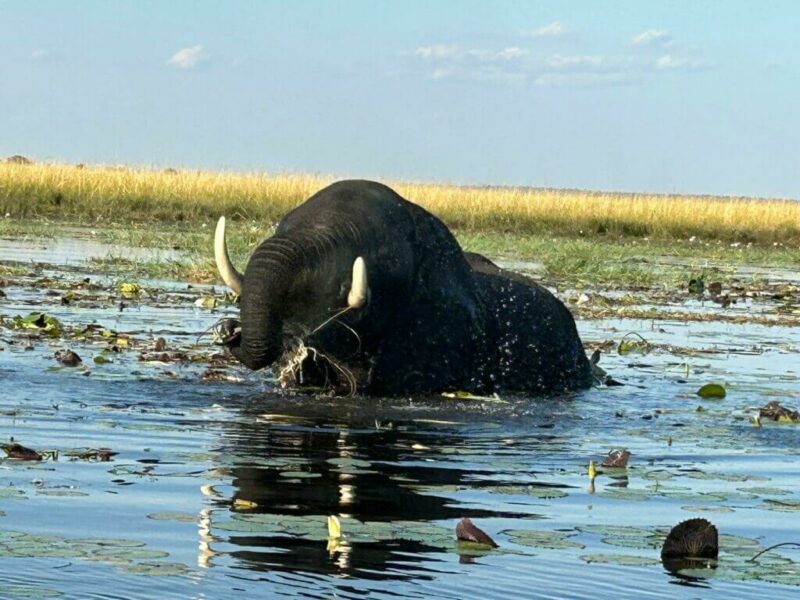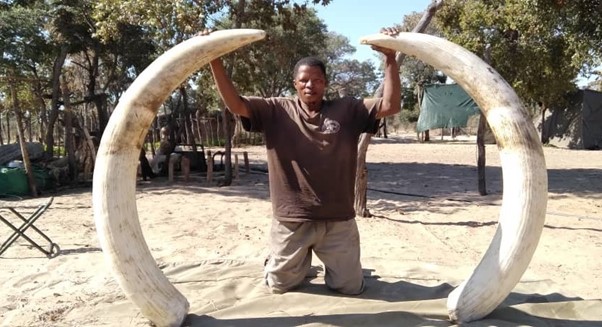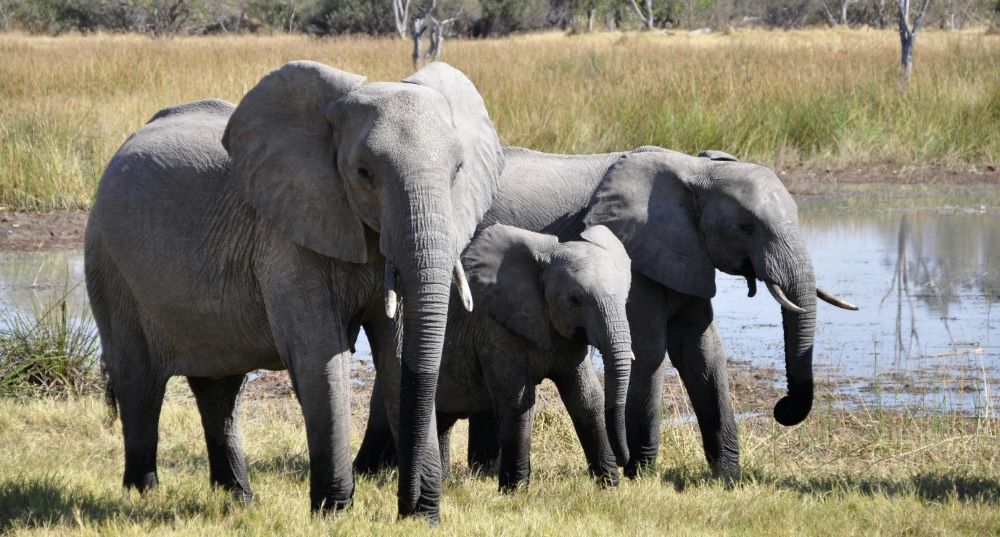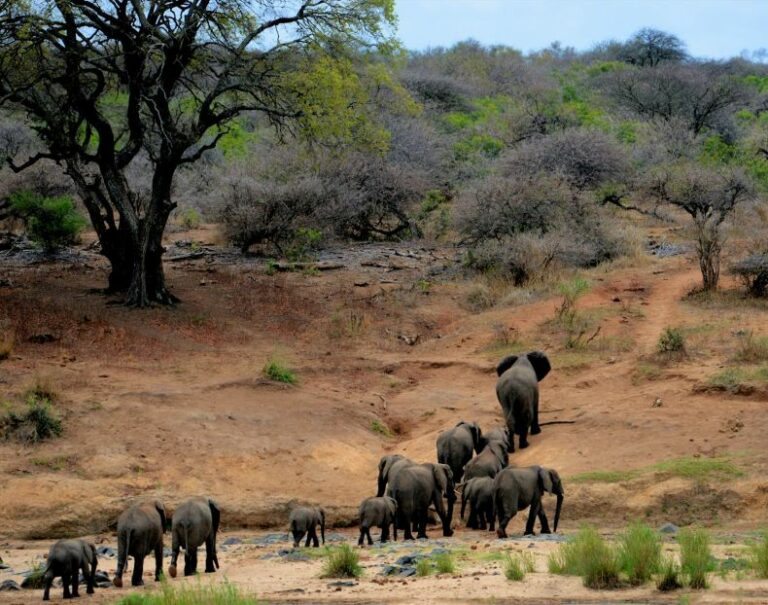Hunting in Botswana, especially when discussing elephants, has always been a very controversial and emotional issue. Like any corporate business, decisions cannot be based on emotions, but on practical solutions and considerations. If we pause and draw a line in the sand, it is obvious that there is a serious elephant crisis in Botswana. A crisis of way too many elephants, certainly not too few.
Elephant trophy hunting in Botswana was banned in 2014. This ban, however, was lifted in 2019. There was outrage expressed by international (and we use the term lightly) conservationists.
Now, it is important to note that the ban was lifted due to pressure from local communities. Local communities had directly suffered because of elephant overpopulation and the ban on elephant hunting BY THE Botswanan government. A single elephant hunting safari would generate thousands of US Dollars, creating jobs, lifting social services, and generating income.
[DYNAMIC-BLOGTABLEOFCONTENT]
How many Elephants are there in Botswana?
Botswana is home to more than 130,000 elephants, which by a mile is the largest population of elephants in Africa. These elephants are part of the 218,000 Elephants in the Kavango-Zambezi Transfrontier Conservation area, known as KAZA.
In 2019, we visited the Chobe Reserve. As a conservationist, I was incredibly shocked to see the enormous levels of habitat destruction. Forest of trees and scrub were totally annihilated. It was heartbreaking to see groups of sable, puku, kudu, and impala having to scavenge for scraps.
International tourists arrive in their thousands to see these elephants but are oblivious to the environmental impact due to large-scale destruction.
Is Elephant hunting Legal in Botswana?
Yes, an elephant hunt is Botswana is legal. On average, about 300 tags, also known as licenses, are issued per annum for an elephant hunting safari in Botswana. Mature bulls are targeted.

Botswana and the Long History of Elephants
Before 1912, the district commissioner explored the Ngamiland district, which is the Northwest area of Botswana for many years. His report stated that there were not any African Elephants in the area and that a few elephants occupied the Chobe area.
Some of our legendary hunters recorded elephant statistics and their finds. In 1853, James Chapman discovered a herd of about 200 elephants in the Southwest area of the Shinamba Hills (now Chobe National Park). Frederick C Selous hunted the Southern bank of the Chobe in 1874. Selous reportedly discovered a hundred-odd elephants and proceeded to shoot several of them.
According to early Bushman settlers who had lived in the areas of now the Chobe National Park, elephants were generally unknown to them, till at least the late 1940’s.
In the early 1960’s, the park warden started noticing a substantial number of elephant tracks entering the park daily. It seemed as if elephants were moving from Zimbabwe and into Botswana. Zimbabwe’s elephant population was increasing at a rapid rate and by the early 1990’s Zimbabwe had more than 75,000 elephants. Extreme culling of elephants in the late 1980s did not materially affect the number of elephants.
Botswana’s elephant population then exploded from a couple of thousand in the early 1940s to more than 130,000 individuals, which by a huge margin exceeds the area’s carrying capacity.
The Chobe reserve, except for possibly in Zambia’s Kafue district, has more animals than any other reserve worldwide. The destruction of habitat by elephants places all other species at dire risk as they just cannot compete with them.
What happened to the Communities when Botswana banned Elephant Hunting?
The bottom line is that those communities immediately suffered. Elephant hunting produced cash flow for housing and the improvement of basic requirements such as ablution facilities and water infrastructure. Unemployment immediately increased. High-protein elephant meat was no longer available and some who were employed in the tourism sector, lost their jobs. The ban on elephants immediately sent people into a state of destitution.
Botswana and the Tough Choices Regarding Elephant Management
The challenge now facing the Botswanan government is that now more than 130,000 elephants inhabit an area that is estimated to only have a carrying capacity of maybe between 30,000 and 50,000. The elephant population is increasing by roughly 6,000 individuals per year.
Considering culling thousands of elephants is a difficult decision to contemplate, but ignoring the problem is even worse. The decision unfortunately is tough, emotional, and highly political. The reality is, what is Botswana supposed to do with all these elephants and what is the impact on the ecosystems?
Let us state the obvious, contrary to international belief, African elephants are not endangered.
This simplest and most logical choice would be to promote safari hunting.
Benefits of Elephant Hunting in Botswana
- Legal and regulated elephant hunting generates more than US $3,000 per elephant.
- Hunting in Botswana, with a focus on elephants will increase habitat. Not only for the elephants but for all animals sharing the same ecosystem.
- Increased Elephant hunting in Botswana will do little to affect the elephant populations but improve livelihoods and create employment.
- Elephant hunting in Botswana can be focused on involving members of local communities, as has been successfully implemented in Namibia, Community members can then contribute towards working with the wildlife they stay with, not against.

Regulated Elephant Hunting in Botswana
The media is always against elephant hunting in Botswana. They have no practical idea as to the situation and publications are deceitful, which in the long term is detrimental to African wildlife.
The media is forever portraying hunters, booking agents, and African outfitters as nothing but just a bunch of soulless killers. This dedicated group of people is the real conservation protecting our animals and sustainably utilizing natural resources.
In Africa, wildlife must be valuable to land and concession owners. Wildlife management programs will only be successful if communities retain a portion of the value. The media should be promoting regulated elephant hunting in Botswana, instead of just continuing to post ridiculous and sensationalist fairy tales.
Mass Elephant Culling is an Emotional, Practical Consideration and Solution
The culling of elephants in Botswana is not a topic that everyone would like to consider. These days, most people do not even want to consider their source of food but ignore the “back-office administration.”
When mass elephant culling took place in Zimbabwe, a local industry developed around elephant products, to be used as profitably as possible. Waste not, want not! The meat was distributed to local communities and the elephant hides were processed.
In my opinion, as we know an elephant hunt in Botswana is not within every hunter’s reach. An elephant hunting safari for trophy elephants can cost more than US $35,000. This would then still exclude the “hidden costs” such as dip and pack, shipping, and trophy taxidermy.
I would market, for roughly 36 months, “Discounted Elephant Hunting in Botswana” and sell trophy / mature elephant bulls and cows for a ridiculously low amount say US $8,000. If 5,000 elephants were harvested every year, the capital inflow (excluding all the secondary generated working capital, would be US$40 million. Even at these numbers, the impact on the elephant population would be minimal. Promoting a” Discounted Elephant Hunting Safari” would be a solution, with local communities benefiting and supporting the decision “all day long.”
The Importance of Increased Trophy Hunting in Botswana
The time to plan Botswana’s wildlife is now, using accurate data and defining goals. Ecotourism is important and can generate millions of dollars. Unfortunately, at present, Botswana only seems to target the wealthy and there is no market for the normal middle-class citizen, this strategy needs to be reviewed.
Promoting big game hunting in Botswana is critical. Hunters are attracted to vast and wild landscapes where conditions are often too harsh for most of the tourists, due to a lack of facilities.
With a focus on safari hunting, Botswana could quadruple its wildlife economy and create thousands of jobs.
Wildlife management initiates, while strategized at government level needs to place the daily management of safari hunting in the hands of local communities. Botswana has the wildlife to convert this asset into a million-dollar economy, which will immediately reduce rural poverty and may materially assist fragile ecosystems.
Why was the Elephant Hunting Ban in Botswana lifted?
- Thousands of elephants literally walk around Botswana causing chaos and mayhem along the way. Fewer elephants would be far easier to manage.
- Botswana was in fact under pressure from local communities who were suffering daily as a direct result of the elephant hunting ban. Lifting the ban did, of course, help with the elections around the corner!
- Cities such as Kasane in Botswana are next to Chobe Reserve where these animals roam freely. When visiting the area in 2022, we had elephants on the road and impala feeding on the street corners! As a visitor, I thought, that is so cool. As a resident, my opinion would be more along the “WTF.” In 2018 and 2019, 17 people in Botswana were killed by elephants!
- Elephants affect rural farmers by destroying crops and pose a real threat to people. It is easy to sit in a luxury apartment in Europe or elsewhere, become a “keyboard” warrior, and post daily on every social media platform about how elephants in Africa are endangered and should not be hunted. Then quickly go online and order your home-delivered Cappuccino! Sadly, most of the people causing the drama are out of touch with reality…
- Lifting the ban on elephant hunting was “what the people” wanted. The reality is that by reintroducing elephant hunting in Botswana, tourism will not be affected at all. Big game hunters ultimately help and assist the conservation and long-term survival of the species that they target.
- Using Kenya as an example: Since Kenya banned hunting in 1977, wildlife numbers have plummeted by more than 70%. As residents lost their jobs and income, they had no choice but to turn to subsistence farming for goats and sheep in areas that were originally allocated as wildlife areas. It is always the same in Africa, if it pays, stays.
- Residents in Botswana will tell you the same thing, they do not hate elephants, factually there are just too many of them and the problem needs to be addressed.

Botswana Condemned
- International Conservationists (supposedly) condemned Botswana for lifting the ban and once again promoting elephant hunting safaris.
- The ill-informed and uneducated, referred to elephant hunting in Botswana as an archaic practice that damaged the image of Botswana.
- The reality is that these international conservations have no idea about wildlife management or what it is like to sit with 130,000 elephants in your backyard, watching them destroy everything in their sight!
- Recently, and quite comically to express a point, the president of Botswana threatened to send 20,000 elephants to Germany, amid a feud over trophy hunting!
- Allegedly, according to German outlet Bild, Environmental Minister Steffi Lemke called on the President to enact stricter rules when exporting elephants killed in trophy hunts due to poaching concerns. Ironically, Germany is one of Europe’s largest importers of game hunting trophies!
- Mokgweetsi Masisi responded with a serious offer to donate 20,000 elephants to “free range” Germany. He also further, and quite rightly so pointed out that revenue received from elephant hunting safaris is used for the conservation of elephants. Agreed, it is easier to sit in Germany, out of touch with reality, and try advising us Africans on how we should be running our affairs!
Elephant Hunting Going Forward
Elephant hunting in Botswana needs to accelerate for not only the elephants but the entire population of Botswana to thrive.
If you enjoyed reading this blog, find out more about conservation hunting in Africa, or Hunting Safaris in Botswana.
Author: P.C. van Wyk
